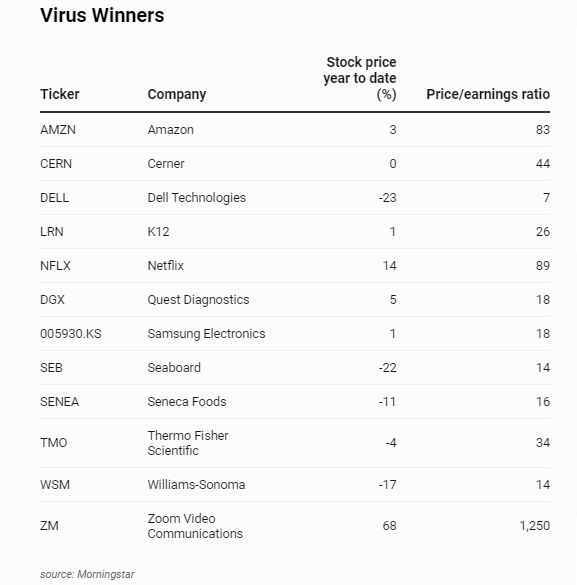Successful businesses of today and emerging consumer behaviour trends
Money makes the world go round.
Today the world spins slower for some businesses, it takes a break or even ends, unfortunately.
But other businesses are flourishing now as there is always an opportunity in every crisis.
It is not the strongest of the species that survives, nor the most intelligent that survives. It is the one that is most adaptable to change.
Charles Darwin
The same goes without saying for the business jungle in capitalism.
It seems that the most successful companies are either present at the right moment, are creatively adjusting to the circumstances bringing along innovations or they are rich enough to weather the storm.
Here is a shortlist of the industries in the US and worldwide that have risen lately or remained successful today. They are listed in a more or less order of importance and are followed by a few new trends in consumer behaviour in the business environment in Romania.
Winning industries

Image source: Forbes
To begin with, this is a radiography of the most important players at the beginning of March 2020.
Experiencing the work-from-home economy
HOME, a word that has been used too often lately, generally associated with the construction/furniture/design industries and the family concept is now correlated with business, jobs and as well with spending the spare time during coronavirus lockdown.
It seems every generation lived through a crisis, and we are not spared either. The difference is that the causes are more subtle nowadays, as the effects are always serious. What began as a trend not long time ago, especially in the IT business – the work from home system, has now quickly spread all over the world and created the so-called work-from-home economy.
Teleconferencing
The most used teleconferencing system, Zoom is now a synonym for remote work. No wonder its stock exchange exploded in 2020.
Founded in 2011 by the Chinese Eric Yuan, it took Zoom only 8 years to reach 2,532 employees, $622 million revenue and $21 million net income in 2019.
Before coming to Silicon Valley and working for Cisco Webex as an engineer, Zoom founder Eric Yuan was denied a visa by the US government 10 times.
The second most known winner in the same industry is Webex – Cisco Systems.
Besides teleconferencing, cloud computing, software and cybersecurity companies have also been increasing.

Home entertainment
Netflix, the films and television programs streaming service is no doubt the solution of choice in home entertainment.
The company was founded in 1997, in California and came to Romania only in 2016. With 169 million users worldwide, it reached in 2019 an amazing revenue of $20.156 billion and a net income of $1.866 billion.
After Netflix, it seems that more people are turning towards video games, as the young and the adults as well play a lot these days.
Healthcare
We are talking here about a huge system, ranging from medicines, protection materials to virus tests and the vaccine industry.
Thermo Fisher Scientific, for instance, is a player in the medical testing equipment industry. Today the medical dictionary is adding new words as we are already talking about AI-based platforms that use voice to detect & monitor the health status, or telemedicine services – virtual medical services.
We are also seeing an increase in competitor collaboration, as GSK and Sanofi, two of the world’s biggest pharmaceutical companies, are joining forces to create a COVID-19 vaccine.
Online education
As schools close, K12 is the winner in the US, a company which delivers software-based educational services.
A global trend lately, the education has moved online in an accelerated rhythm, universities worldwide have more and more online training options and there is an abundance of webinars, online classes and trainings.
A great variety of online classes makes it now easier than ever to learn whatever you wish: there are platforms that bring huge education resources under the same umbrella such as Udemy or platforms concepts that reunite world top experts such as Mindvalley, Gaia or Masterclass.
One might find it a little bit overwhelming, as there is an avalanche of information and technology that our brain begins to cope harder with. The situation is also creating the feeling of not having enough time to process or to integrate the information.
Telecom companies
As we are staying home, the need to talk to our family and friends and as well as with the work team is more powerful. That ensures the stability of the telecom industry at this moment.
Consumer goods
Even if they do not really need to, people are buying more lately. Amazon and Alibaba online marketplaces rule worldwide.
The Los Angeles Times has announced that Amazon.com stock climbed 5% last week, increasing Jeff Bezos’ empire with $ 24 billion in the first three months of this year.
In the US, Williams-Sonoma, a retailer of food home preparation gear, Seaboard Corp., a seller of food commodities and Seneca Foods Corp., a producer of frozen and canned foods are the market segment leaders.
Walmart’s sales have also increased by 5% since the beginning of the year.
Johnson & Johnson, specialized in pharmaceutical and consumer goods and its competitor Procter & Gamble are also recording higher sales.
Electronics & IT products
In the US, Dell Technologies is in top sales in its segment as employers are upgrading the laptops their employees use to work from home and Samsung Electronics continues to sell phones and TVs.
Banking – contactless payments
Be it online, by card or by mobile, the digital payments technologies are experiencing a new boom at this moment. As a result, tracking payments and gathering data on customer preferences will be more precise.
A few trends in the Romanian business environment and consumer behaviour
At a certain moment, hopefully soon, life will go back to normal. But it will be a whole different normal as things will never be the same again.
Living and doing business in Romania have already changed, hence consumer habits have changed, too.
People are reconsidering their lifestyle, the way they perceive the world and their personal values.
They are enjoying family experiences, they spend more time with partners and kids. They communicate more with friends. Online school has become the norm.
In the last years, the classic television consumption has decreased step by step. But if we are to compare March 2019 and March 2020 figures, the following result emerges: there are 360.000 more viewers at the national level and the total audience watching TV in the evening (prime-time) in March reached 8,6 million out of a total population of 22,175 million (Romania’s population at January 1st 2020). Of the 360.000 persons, 250.000 are urban viewers.
The video streaming platforms Netflix and HBO Go have also reached high usage levels. No data available for Romania for 2020 regarding the percentage increase, yet at the end of 2019, a study on urban media consumption habits showed that 7 Romanians out of 10 have at least one video streaming subscription.
Less is more. People think twice now before spending their money. They hope for the best while preparing for the worst.

Romanians are cooking and baking more at home. The internet buzzes with homemade food and deserts pictures. We are suddenly realizing that we can cook healthier and cheaper at home. In the weeks before Easter, a shortage of yeast occurred; it was so unusual to see the message “updated yeast stock” on a grocery website.
When talking about learning habits, we are experiencing a technology learning boost as people are using a greater number of applications and in a more intense rhythm than before. Many older people are also trying to make up for the gap between them and the young when using modern technologies.
It is very likely that some of the temporary changes and adaptations that we are undergoing now will become permanent. For sure companies will be more open from now on to videoconferencing services and to remote work systems as going to the office means spending time and money.
More offline businesses are moving online and they do it in an accelerating way, forced by the situation.
A lot of selling platforms appear as a business opportunity to facilitate and capitalize on the new wave of offline-online transition. At a larger scale, I’ll mention the Elefant Marketplace initiative, a place companies can sell online and also benefit from the existing logistics services. Emag remains the leader marketplace in Romania with 16.350 active sellers and group revenue of RON 4,77 billion (in 2018).

At a smaller scale, we are witnessing the appearance of many online platforms and the usage of social media as selling channels for local, independent small businesses. First, there were greenery and vegetables supplying services, now farming products such as meat, cheese or milk are going online. Besides, the online groceries number has increased in a very short period of time.
I am glad to see there is now an increasing preference for local and made-in-Romania products and that the business-to-consumer chain is becoming shorter. Business people and big retailer chains are becoming aware that stocks are also easier to update when collaborating with local suppliers.
Previously niche industries are becoming a normal standard – food and goods delivery companies such as Glovo, Foodpanda, UberEats, Bringo and Takeaway are gaining more popularity.
People and businesses are reinventing themselves right now, they respond quickly to the situation challenges. They are either innovating the existing offer of products and services, either reinventing 180 degrees the businesses models.
For instance, transportation companies such as Bolt and Free Now (ex Clever) are launching Business Delivery services to connect the suppliers with the end consumers and increasing their brand awareness by offering free rides for medical personnel. they are also going to fit their cars with protection screens set between the driver and the clients.
Everybody is selling or producing face masks – starting with clothes manufacturers to the neighbourhood-tailoring little companies.
They say the Romanians are inventive and witnessing many total business shifts proves that right. Now it is not important what you sell, but to sell nonetheless: from watches to FMCG, from toys to face masks and medical protection equipment, from events organizing to delivering weekly cooked food subscriptions. A Romanian bus manufacturer switched to disinfection tunnels. A state-owned arms manufacturing company has adapted its production and will begin to make protective masks.
New ways of advertising emerge now. I don’t think I’ve seen so many free trial products/services before or so many free resources for short term access. The video content continues to rise.
The electronic signature is beginning to be accepted in official documents with public authorities and institutions.
Accessing start-up funds and European funds are still available instruments in the actual business environment.
At the end of March, the total internet traffic in Romania increased by 12% in mobile networks and 20.9% in landline networks, while voice traffic recorded average increases of 22% in mobile networks and 22.7% in landline networks (source).
It seems that now we talk more on the phone at noon than in the evening, and in some networks, voice and data traffic no longer have high values in the morning and evening, but have become linear throughout the day.

Instead of conclusion
Here are two questions that don’t want to leave my mind these days:
Can’t stop wondering, yet in the end what are the real companies – the economic giants and who are the persons/powers that will benefit the most from people’s health problems and the economic crisis? These are open questions for anyone who wants to put the puzzle pieces together. I cannot stop thinking either how fragile our life is.
And what about the consequences of the social distancing/working-from-home trend on an anthropological level? I know, superficially said, as first reactions, maybe more divorces and maybe more children at the end of the state of emergency. But I mean at a deeper level, regarding future human behaviour.
Mark Mason, BRAND MINDS 2020 speaker (the event was rescheduled for September 25th) has recently launched the FOGO concept (the fear of going out), starting from FOMO – the fear of missing out.
FOGO is the inversion of FOMO. Whereas someone with FOMO feels constant anxiety that they may be missing out on something spectacular by staying in, people with FOGO live with constant anxiety that they are guaranteed to miss out on something horrifying by staying in.
Mark Mason
Joe Dispenza and other scientists say you need 21- 30 days to install a habit, to rewrite a neuronal path and a few months of practice to make it last.
It seems that we are going to experience the “stay-at-home” state long enough to create and enhance new habits. Another open question…. Time will show us quite soon.
Stay safe. Be well.
Join the Conversation
We’d love to hear what you have to say.
Get in touch with us on our LinkedIn Group, Facebook Group or Twitter.
Getting us Through the Crisis: 10 Ways to Build Mental Resilience
The Coronavirus (COVID-19) is seriously challenging our social, economic and business stability, as well as our freedom of movement and working practices.
It is not surprising then that this is having a detrimental impact on our mental health.
Our human vulnerability and ability to cope with this threat has been exposed. Naturally, people are fearful, anxious, uncertain and some of us are panicking.
This is clearly a time to take positive action and follow necessary precautions, as well as keep a tight rein on our emotional reactions.
It’s important to recognise the dangers and to acknowledge our fear and anxieties, rather than be driven by them.
This means constructively handling our health and stress, developing ways to cope and not allowing our fears and irrational reactions to get out of hand.

The Coronavirus (COVID-19): 10 Ways to Build Mental Resilience
During a crisis, it’s important to know ways in which we can adapt and strengthen our resilience, in order to maintain good mental wellbeing.
1. Make Healthy Home-Work Adjustments
Set and maintain your personal & professional boundaries. Managing time spent on work and socially, in a way that best suits your present needs & situation can help to reduce pressure and conflict.
Schedule time with family, friends & colleagues for home/remote activities, such as mindfulness, yoga, meditation, listening to music, dancing, reading, book reviews, or just chatting. These can help to reduce stress and lift your mood.
Avoid putting pressure on yourself and thinking negatively as this is counter-productive.
2. Perceive Things as Challenges Rather Than Problems
When presented with a problem focus on finding a way forward and attaining a clear goal.
Having a constructive view on the present situation and working towards a specific outcome enables you to positively draw on all of your resources, in order to get you to where you need to be.
3. Cultivate a Positive Mindset
Exposing yourself to positive internal and external messages can help build confidence and counter our negative bias, supporting a more productive mindset.
4. Establish Good Sleep Habits
Sleep is essential for your overall physical and mental health and well-being.
Good sleep helps to build your resilience in dealing with stress and anxiety.
Create Healthy Sleep Routines & Behaviour:
✅Get up and go to bed at regular times
✅Avoid heavy meals, exercise and using screens, a few hours before going to bed
✅Ensure your bedroom is dark enough and a comfortable temperature
5. Set Realistic Expectations
Reflect on the expectations set by yourself and others.
Examine how realistic these are and adjust them according.
Identify manageable steps in meeting expectations. This helps to limit disappointment and stress, as well as enabling you to achieve your goals more easily.
6. Eat Healthily & Remain Active
Eating well and being active will help to keep up your energy, strengthen your immune system and assist to maintain your physical and mental fitness.
7. Beware of Your Alcohol or Drug Intake
During crisis or times of high stress, it can be easy to be tempted into increased or improper alcohol or drug use. Remain vigilant and keep busy. This will enable you to remain focused and avoid creating or worsening your mood or situation.
8. Stay Safe & Stay Connected
There is a huge amount of advice being given about how to keep yourself and others safe. It is not only wise but can be lifesaving to follow informed messages and official sources.
To help cope with isolation and physically distancing regularly check-in and remotely connect with others. This enables you to gain reassurance and companionship through being connected and supported.
9. Talk About Your Feelings & Seek Support
Sharing your experience can be a great relief. This enables you to gain understanding and support, assisting you to deal better with your situation and feelings.
10. Self-Care
Monitoring your mental health, along with engaging in actions to reduce stress, such as exercise, taking breaks, healthy eating habits, having fun, meditation & listening to music, can help lift the mood and maintain better health.
Reach out for support if you notice signs such as prolonged low mood, excessive anxiety, increased anger and aggression, anxiety and panic attacks, obsessive thinking and behaviour, loss of hope or interest, feeling or thoughts of self-harm.
We should not underestimate how much the threat and difficulties, presented by this crisis, can deeply unsettle and distress us. This can exacerbate conditions and seriously impact those who have already been experiencing a poor mental health or mental illness.
The list at the end of this article provides information on mental health support options (UK Only).

The Road Ahead
Like never before, has there been an essential need for taking care of our mental health.
This is a top priority for everyone. Our human limits and mental capacity are being strongly tried.
Coming through this crisis well will require significant support, commitment and investment in our mental well-being and resources. We must now rise to the challenge.
Seeking Mental Health Support (UK)
For anyone seeking support with their mental health here are a range of available support options.
Gov UK Mental Health Support
Provides advice to support mental health during the coronavirus (COVID-19) Crisis. People struggling with their mental health during the coronavirus (COVID-19) outbreak will be offered additional online support and practical guidance to help them cope:
New Advice to Support Mental Health During the Coronavirus Outbreak
NHS Mental Health Support Helplines Resource
Provides a national list of organisations supporting people with a wide range of mental health problems and mental illnesses: Mental Health Helplines
Shout – TEXT 85258
Shout is the UK’s first 24/7 text service, free on all major mobile networks, for anyone in crisis anytime, anywhere. It’s a place to go if you’re struggling to cope and you need immediate help.
Join the Conversation
We’d love to hear what you have to say.
Get in touch with us on our LinkedIn Group, Facebook Group or Twitter.
Mihai Bonca on crisis management marketing: Is your brand willing to adapt in order to contribute?
Mihai Bonca is a marketing strategy and brand transformation professional. He has over 15 years of experience in marketing as a Marketing Director for various brands ranging from traditional FMCG to B2B, IT and eCommerce. Currently developing his consultant career, Mihai is also contributing towards the next generation of professionals as a Marketing Strategy Lecturer in different Business Schools.

Mihai Bonca
Today we are all struggling to flatten the curve and prevent the spread of the novel Coronavirus (Covid-19).
Businesses worldwide are contributing in various ways to support the efforts of research facilities working to find a vaccine and employees working from home by offering free video conferencing tools.
In times of crisis, communication is vital.
But how should brands manage this particular crisis or any other crisis? What should crisis management marketing be about?
I reached out to Mihai and invited him to answer my questions on how brands should approach crisis management marketing.
Read the answers below.
Question: Crisis management marketing: how should brands react and respond to the global Coronavirus outbreak?
Mihai Bonca: The best companies and brands outlive a crisis by showing an increased sense of awareness towards themselves and the others.
They manage to spot and bridge the gaps that did not exist before. The best leaders act on fast-forward, replacing the need for perfection with pace and an acute sense of urgency.
The classic manual of crisis management has three steps: the leader must take control and show he/she is fully in charge; has to show that understands the issue; has to act forcefully, overcompensating.
Trust, knowledge and control are the main ingredients.
But let’s take a more in-depth look.
The crisis disrupts the fabric of existing behaviours. It starts by altering the patterns of everyday life and influences the client’s psychological needs. Everyone backslides towards safety necessities. The blow of a crisis challenges the old norms, and as a result, it levels the playfield between different kinds of companies.
Every crisis has its own degree of novelty and innovation. The 2000 crunch was focused mostly around the internet fizz. The 2008 depression was triggered by the housing bubble and infected the financial markets. Now, we have a new class of situation, a step-up in the crisis category: a health calamity and a lock-down impairment. There is no manual available in the corporate world on how to respond to it.
[bctt tweet=”Marketing Strategy & Brand Transformation Professional Mihai Bonca on crisis communication management: Replace How can we deliver our sales targets? with How can we change, contribute and help?” username=”brand_minds”]
How can companies tackle this new enemy?
After outpacing the first “freeze” moment, some companies will do what they know had performed before in other dire situations, only more aggressively. Facing cash flow issues, they will contract. Most companies will tighten around core business, cut costs, increase the revenues for those few products that respond to basic needs, lay off redundant employees. They will rapidly exit fragmented or unprofitable markets.
It is a decent reaction. With a certain degree of luck, and if they had their coffers full after the boom years, they would survive the hibernation period. Afterwards, they will return to their old businesses, slender and more vigilant.
At the same time, every crisis creates an exceptional class of winners. These are the few companies that will act differently from the early beginning. They are sharp, flexible and will step forward. They will seek to make a difference. They will think first about the physical and psychological safety of their employees and then about their active involvement in the communities. Instead of cutting their losses, they will adapt and invest. The leaders will replace the question How can we deliver our sales targets? with How can we change, contribute and help?
These companies are neither the largest ones nor do they have a better crisis manual.
They genuinely learn by doing, accepting mistakes and following their instincts. The instinct of a company is embedded in its culture. Their ambition, key values and beliefs, the way the team members trust each other will surface in these difficult times.
Now is the best opportunity for a company and its management to highlight what they are made of. Or to recognize that all the nice words are just corporate fluff, a wallpaper they put conveniently behind the reception desk.
The companies that will block and suffer most are the “command and control” ones. They natively do not trust their own people’s judgement. They concentrate the power of decision to a few all-knowledgeable executives. Their line managers do not work for the external clients or for the communities, but to please the higher-paid persons in the organization. The “pleasers” were promoted not because they were nimble or strategical, but because they obeyed orders and efficiently implemented the ideas of those in charge.
The news is that the environment has changed, and one or a few people cannot hold all the answers.
The winners of the crisis will learn new skills very fast. These companies will make a difference just because they have entrepreneurial people leading the frontline squads. These organisations are made up of independent cells that do not wait for orders, there is no time for that during a war.
They have the natural reflex to recognise what is right or wrong and what has to be done. These companies will intuitively transform during these months and will emerge as the new organisms that will dominate a transformed food chain. They will be the forerunners when the crisis eventually ends.
This crisis will help terminate some of the autocratic “command and control” companies. Hard power will be replaced by soft power, orders by influence, pleasers by self-governing people.
The stars will be those organizations that have a clear ideology, act fast, are adaptive, organized in squads, led by
autonomous and virtual leaders. Each internal group can react quickly and independently.
It is a perfect opportunity for brands and companies to highlight their DNA and inner values. On the shorter term, the rational benefits will attract consumer trust. On the longer run, the public will feel safer with the brands and companies that prove they are leading the way out of this crisis.
These could be the enterprises that show they care, have empathy and intend to contribute to the community.
How can we contribute and help? will be the acid test for companies and brands.
Q: What should a brand’s marketing communication plan include?
MB: Whatever a company planned just one month ago is 100% out-of-date.
Organizations should start from a blank piece of paper. Please scrap the old activity plan and the old communication materials before creating new ones.
Give a fresh start, recognizing a completely different reality, set meaningful objectives, connect with different tensions and a different state of mind of the consumer.
The new plan should feature a mindset crafted for a “commando” mode. Flexible and adaptable, fluid, able to change from one week to another. Hopefully, the brand strategy had been completed before, and everyone knows the brand DNA well, its strengths and limits and audience insights.
[bctt tweet=”Marketing Strategy & Brand Transformation Professional Mihai Bonca on crisis communication management: If your brand does not have anything to offer or is just trying to sell unnecessary products, please stop.” username=”brand_minds”]
I recommend starting the new plan and the new communication by acknowledging the aspects that have already transformed the audience. What are the key changes in their dreams and tensions? What are their new habits? How did the individuals adjust their consumption behaviours? What are the new media touchpoints?
The next step would be to understand if the brand has a “Big Idea”, or something meaningful to offer. Is it something the brand can contribute with or is it a sales incentive nicely packed?
If your brand does not have anything to offer or is just trying to sell unnecessary products, please stop. This will only highlight your brand’s irrelevance, wasting money and playing with fire. People will prove these brands wrong.
A “Brand’s Big Idea” shouldn’t be a communication direction. Think about the active substance, not just about the coating. The active substance should cascade in the marketing mix, influencing product, packaging, pricing, distribution and partnerships. If it can meaningfully change the mix, then it can improve the end benefits.
[bctt tweet=”Mihai Bonca on crisis management marketing: The issue is not the communication itself. The challenge for the marketing team is to show how a brand is willing to adapt in order to contribute.” username=”brand_minds”]
After the “Brand’s Big Idea” is settled, media limitations can assist a team to become more innovative. Digital is the best channel. It is quick and the production basically takes minutes or hours. It also gives brutally honest feedback, showing if there is any active substance or not. The public will propel the campaign if it is relevant or bury it alive if it fails to convince.
Radio is also quick, clean, with a rapid and cheap production. However, to rise above the high radio clutter, brands need novelties.
Packaging is also a great channel. Takes a longer time to be modified but represents free media, when it matters the most, at the point of sales.
Traditional TV is probably the worst medium. Why would someone create a TV ad these days? It is costly, a new production adapted to the moment is difficult if not impossible. TV does not provide rapid consumer feedback.
During these war times, actions are more powerful than ever. Word of mouth and free PR will filter the significant brand initiatives, that have an active substance, versus the frivolous ones.
The issue is not the communication itself. The challenge for the marketing team is to show the way a brand is willing to adapt in order to contribute. Most brands will just prove they are irrelevant.
Q: Dos and Don’ts of marketing strategy during Coronavirus-crisis
MB:
Best practices:
![]() Organise in squad teams, adapt, be flexible, scrap the old plans. Start the change with
Organise in squad teams, adapt, be flexible, scrap the old plans. Start the change with
yourself, accept mistakes, learn as you do.
![]() Be empathetic with your audience, real and contextual.
Be empathetic with your audience, real and contextual.
![]() Challenge the ways your brand can genuinely contribute to the wider community.
Challenge the ways your brand can genuinely contribute to the wider community.
![]() Craft a “Brand’s Big Idea” in crisis. Show that the brand has “active substance”, it is not just a
Craft a “Brand’s Big Idea” in crisis. Show that the brand has “active substance”, it is not just a
sugar-coated fluff. Use the entire marketing mix.
![]() Actions are more powerful than words. There are companies that have already shown us how to
Actions are more powerful than words. There are companies that have already shown us how to
do that: LVMH started to produce hand sanitisers, Pernod Ricard donated alcohol (from
Absolute Vodka), Coca Cola dropped the media spending and donated the budgets, auto
makers joined the race to do ventilators, Inditex started producing masks.
Worst practices:
![]()
Continue with the old communication as nothing happened. This just shows an inability to have
empathy, to contribute, or to change.
![]() If you are lucky enough to be in a category in high demand in crisis, do not use the crisis to
If you are lucky enough to be in a category in high demand in crisis, do not use the crisis to
increase profits. Do not boast yourself. Do not hike up the price just because there is no
alternative. People are going to remember the immoral behaviours and penalize properly
afterwards.
Q: Corona beer and Coronavirus. What should brands do when their name is associated with
unfortunate events?
MB: Corona beer is facing some headwinds, not all related to its name.
Beer is not a category who appeals to basic psychological needs, therefore the entire market will drop significantly. Just think about all the bars and restaurants which closed down.
A further minus, the communication of Corona built over time an emotional category linked to outdoor fun and beachy sensations. This is not a relevant space now and will not be for a while.
Then follows the name similarity. If someone has a friend or a close family member who suffered due to the virus, the simple name Corona will trigger negative emotions. For the rest of the people, the association will pass in time.
There are examples of brands that emerged more powerful after serious disasters, reacting properly. Tylenol is a text-book case.
When the crisis ends, Corona has the opportunity to step forward, act, and communicate what their brand is and what it is not about.
On this regard, Corona in the USA just announced a donation of 1,000,000 USD to the Restaurant Workers Relief Fund. Which goes into the right direction. I am curious if post-crisis, Corona will return to their shallowish communication, Let’s pretend nothing happened. We’ll just squeeze lime and have fun on the beach as we did before.
Join the Conversation
We’d love to hear what you have to say.
Get in touch with us on our LinkedIn Group, Facebook Group or Twitter.
Looking at the glass half full – 13 positive aspects of staying home
Working from the bedroom at home. Social life in isolation. Action through… un-action. Just a few paradoxes that we are living these days.
And we are realizing the following:
History repeats in subtle ways.
The war concept is now updated.
People live and processes happen in cycles: Adaptation. Continuity. Evolution. That’s just life itself.
13 positive aspects of our life during coronavirus seen through the lens of an ordinary person
1. A journey through our interiors
The dictionary defines isolation as follows:
1. Total separation of a thing apart from the neighbouring ones.
2 (Specifically) Separate a contagious patient out of the healthy persons to prevent disease transmission. (…..)
5 (Metaphorically) Removal of someone from their peers, from social life. See also: isolated1 (5).
Usually, the isolation is done inside a building, it is about interiors. And here’s how isolation becomes these days forced introspection – we are now travelling through our interiors. This saying is now circulating in social media:
If you cannot go outside, go inside.
As if we suddenly walked into a glass door, we are first bewildered that we didn’t see what was right in front of us, then we take a step back and realize it might not be the right way. For us as individuals or as a collective.
We re-learn Why?, the art of questioning and self-questioning.
Why is this happening? Why now? Why such magnitude?
Who will win out of this situation? How much is induced panic and how much is it true?
How serious is it? How do we protect ourselves, our loved ones and those around us? How…. and the list continues.
It seems it is time to go back to our essence, to reinvent ourselves and the way we live.
Awareness as a cold shower is always good. It makes space for better actions to come.
2. Health first and foremost
Health in the first place. Again. Ranking at #1, the place health should always be at.
Yet, how is it possible that we so often forget about the most important matter?
Human nature is difficult to understand. But fear of suffering and ultimately fear of death can be useful sometimes; they can shake us back into reality.
One cannot breathe deeply and worry at the same time.
Taking a pause from the unnatural rhythm that we experience every day is more than welcome. It seems we have received a second chance, or a third chance or …..and the Universe is generous.
Now that we’ve switched focus on health, let us hope this time we shall be wiser and we shall approach health in a holistic way – find the balance for every one of our bodies – mental, physical, emotional, spiritual. And that we shall take into consideration our wellbeing, as well as the wellbeing of the people around us.
Interestingly enough, before the virus, we would think more about the past or the future, but now the situation forces us to consciously live in the present.
We are becoming the creators of a new reality, where our soul reigns and where we respect and love ourselves.
3. Our happiness inventory
I believe this is the perfect moment to think about what really makes us happy.
Who are the people and what are the things we cannot live without? What things can we be without?
We shall find out once again that less is more. Now we can rearrange the list – people, things, goals, actions.
Let us make the decision to meet people that we resonate with and who can be “teachers” for us. Let us look for the company of positive people and circumstances that make us feel good and fulfilled.
They say you cannot be happier until you are happy with what you have. This is about gratitude.
Gratitude makes us appreciate the simple, beautiful and amazing things about and around us: that we are alive and healthy, that we can see, feel, think, run, kiss, hug, love. That we have a roof over our head, knowledge, family and friends. That we have dreams we can turn into reality.
Feeling grateful always provides us with better energy vibration and with peace of mind.
4. A balance-sheet moment
Why not? As people do during winter, let us sit by an imaginary fireplace and wonder:
Where am I? Where do I want to be? How long is the road?
I know spring has just begun, but let’s “spring” our conclusions of the first three months of the year.
Every now and then, I do some soul-searching to see if I am true to myself, if my thoughts, words and deeds are aligned with each other. I search to see if I lost my way. Although I am not always kind to my soul and the remains of the perfectionist I once was will be criticizing my conclusions, it is a necessary process to bring myself back on track.
What questions do I ask myself exactly?
Here they are:
Do I love and do I always know how to love?
Do I live out my passions?
Do I share my gifts?
Oh, it is so good to know your gifts! Mine are mainly related to beauty and harmony, design, photography and handmade. I am a good listener and some people say I am sort of a healer.
Do I live in a meaningful way?
What is my legacy?
I believe everyone should find answers to these questions.
Let us write down the answers and make sure we read them again at least a few times over the coming months. I did just that at the beginning of the year and now I have revised it.

5. WFH – an acronym in fashion these days
We experience working from home now more than ever and technology helps us connect with the team in various ways.
Since I started working from home, I got back the hours spent on going to work. As a matter of fact, I am saving two hours every day, ten hours every workweek. That is more than one working day!
Well, that’s a lot of time! Hours that I can use for myself, maybe to be together with my loved ones or to learn something new.
Also – no more crowds and no more walking through polluted air anymore.
If I am to count other pros and benefits of working from home, here they are:
- I listen to soft jazz during work,
- I drink tea more often and I remember to drink water,
- I don’t spend money on expensive lunches in the restaurants near the office,
- Because there are fewer interruptions and disruptions, I can better concentrate on my work, especially when it comes to creative work.
There are some disadvantages of working from home: I miss the team, human connection and real-time, fast reactions.
Long story short, the work is done and there is a little bit more time gained for myself.
6. New ways of socializing
We are experiencing new ways of being and living. We are changing habits and going out of our comfort zone a lot, with our partner, our family and friends.
Now we have the opportunity to reconnect with family and friends like we always wanted to or how it was normal, but we couldn’t because of the crazy rhythm we were caught in.
If until now we missed having a warm conversation or discussion to fix a particular situation, now it’s the time to do it.
Although everybody works from home during the day, we are together, in the same house or in the same circumstances. Therefore let us enjoy and cherish this newfound togetherness.
A few days ago we celebrated a friend’s birthday through the Zoom app. As much as I am against applications that alienate people, it seemed that finally it… “didn’t hurt”. We even clinked our glasses while wishing him Happy Birthday. Maybe next time we’ll “eat the cake” and “host a party”. Away from each other, yet close.
7. Readlaxing & co.
Staying home by ourselves might be a blessing or it might easily mean feeling scared and anxious.
I personally think we never have enough time for ourselves and this is a good opportunity to make the best of it.
I must say I never get bored being by myself. Here is my set of relaxing activities:
- reading – I enjoy reading and I have definitely been reading more lately; I also prefer physical books;
- listening to my favourite music;
- watching films (not series) can also be nice from time to time: a comedy film could change our mood, others could enrich us in some other way;
- meditating – a good balance between work and relaxation keeps us sane.

8. To dance or to exercise?
Better both. As I’m not allowed to go to my dancing classes anymore, I am practising at home. All I had to do was to change the place of the mirror and everything was fine. That was easy!
Since I’m not much of a gym lover (I prefer alert walking in nature or climbing the mountains to going to the gym), I had to take into consideration exercising or stretching in the house. Also, I used bamboo sticks to activate the lymphatic system.
9. Sun-kissed and gorgeous magnolias
It’s so nice to say hi to the sun after work. And to the splendid magnolias near my house. Until now, when I would come home from work, the sun would have already gone to his home in the sky.
Fresh air … is great. For a great nature lover such myself, stealing short moments of being outdoors plus the flowers in the pots should be enough for now. I have just heard someone say
Tomorrow I’ll visit the botanical garden from my balcony.

10. Becoming Chef of the Castle
My home is my castle. And the kitchen castle has come alive.
They say the food that we cook ourselves is healthier because it’s prepared with care and love and it encapsulates our energy. Not to mention we control what ingredients go in the food therefore we can eliminate any surprises like hidden additives or added sugar.
I started cooking more often and I took up baking home bread again. To be honest, the initiative began with a dessert, but then it was quickly followed by more cooking. Making desserts has a special meaning for me – if I’ve come to this point, it means I finally have time for myself.
Preparing a meal and the ceremony of arranging the table for the family or even just for me is always a pleasant experience. Having lunch or dinner together is an occasion to celebrate life.

11. Practising humour
Humour helps us to overcome the situation more easily. Dark humour is accepted – life is made of grey shades.
People are so creative in making fun of difficulties that I laughed in the past two weeks more than I laughed in the past two months.
12. Procrastinating… procrastinated. Or a temporary good-bye to it.
Since we’re staying home and going out only for the bare necessities, we can make up for some postponed stuff – be it personal or professional development, a personal project or just simple, yet useful administrative stuff.
Online is and will be the king. I feel that with so many classes available online I am learning more than before these days. And there will be many more because the digital learning trend is becoming more powerful.
New knowledge brings expertise and confidence. A personal project – fulfilment; a tidy house means a tidy and peaceful mind. Because micro is always reflected in the macro.
13. Finances and safety
Save money and money will save you at a certain moment.
Having savings for unpredictable situations gives us a feeling of safety and continuity.
If saving money was not a priority before and we used to think the quickest way to double our money was to fold it and put it back in the pocket, these days the importance of long term financial decisions is more obvious than ever.
And another positive aspect of this period of time is that we are reducing waste and relearning to manage all kinds of resources – financial, time, food, sleep, love, health.
These are the current advantages I identified.
What other positive aspects can you find?
Join the Conversation
We’d love to hear what you have to say.
Get in touch with us on our LinkedIn Group, Facebook Group or Twitter.

